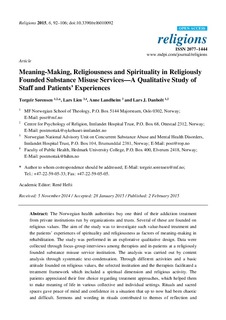Meaning-Making, Religiousness and Spirituality in Religiously Founded Substance Misuse Services—A Qualitative Study of Staff and Patients’ Experiences
Journal article, Peer reviewed
Permanent lenke
http://hdl.handle.net/11250/279982Utgivelsesdato
2015Metadata
Vis full innførselSamlinger
Originalversjon
Sørensen, T., Lien, L., Landheim, A. & Danbolt, L.J. (2015). Meaning-Making, Religiousness and Spirituality in Religiously Founded Substance Misuse Services—A Qualitative Study of Staff and Patients’ Experiences. Religions, 6, 92-106. doi: http://dx.doi.org/10.3390/rel6010092 http://dx.doi.org/10.3390/rel6010092Sammendrag
The Norwegian health authorities buy one third of their addiction treatment
from private institutions run by organizations and trusts. Several of these are founded on
religious values. The aim of the study was to investigate such value-based treatment and
the patients’ experiences of spirituality and religiousness as factors of meaning-making in
rehabilitation. The study was performed in an explorative qualitative design. Data were
collected through focus-group interviews among therapists and in-patients at a religiously
founded substance misuse service institution. The analysis was carried out by content
analysis through systematic text-condensation. Through different activities and a basic
attitude founded on religious values, the selected institution and the therapists facilitated a
treatment framework which included a spiritual dimension and religious activity. The
patients appreciated their free choice regarding treatment approaches, which helped them
to make meaning of life in various collective and individual settings. Rituals and sacred
spaces gave peace of mind and confidence in a situation that up to now had been chaotic
and difficult. Sermons and wording in rituals contributed to themes of reflection and
helped patients to revise attitudes and how other people were met. Private confessions
functioned for several patients as turning point experiences influencing patients’ relations
to themselves and their surroundings. Spirituality and religious activity contributed to
meaning-making among patients with substance use disorder and had significance for
their rehabilitation.
